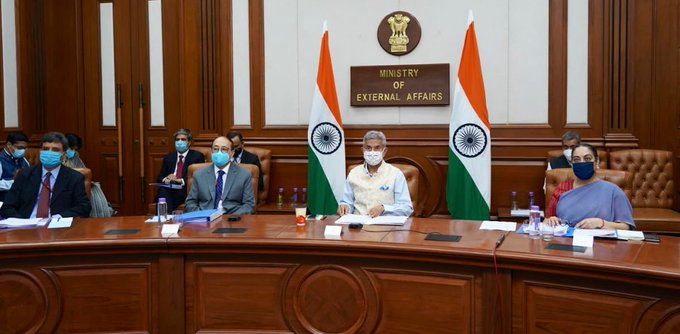India Promises to be Africa’s Most Steadfast Partner: Dr. S Jaishankar
New Delhi: India promises to be Africa’s most steadfast partner. This was stated by Dr. S Jaishankar, Minister of External Affairs, Government of India while addressing the Inaugural Session of the 15th CII – Exim Bank Digital Conclave on India – Africa Project Partnership today. According to the Minister, India kept its supply lines open during the peak of the COVID pandemic and ensured that critical supplies such as medicines and medical equipment reached countries in need in Africa.
He re-iterated the commitment made by Prime Minister Narendra Modi in his address to the Ugandan Parliament and stated that Africa remains at the top of India’s priorities and that the partnership with Africa would continue to be guided by Africa’s needs. To this end, he noted that the Government of India had already undertaken 194 development projects in 37 countries and 77 more projects in 29 countries were in the pipeline. These projects were in the areas of ICT, water, agriculture, infrastructure development among others. He referred to digitalization as being a force multiplier and stated that India’s e-VidyaBharati and e-AarogyaBharati projects were empowering Africans in terms of tele-education and tele-medicine. Similarly, India’s ITEC programme was helping build IT capacity in Africa.
The Minister observed that Indian industry had also invested in a big way in Africa with investments in consumer goods, automotives and pharmaceuticals among others. He stated that India’s oil and gas companies had invested US$ 7 billion in oil exploration in Mozambique and South Sudan. In addition, India’s Duty Free Tariff Preference programme had provided enormous market access to African goods in Indian markets.
Looking ahead, the Minister stated that cooperation in areas such as defence and security would form a key pillar of the India – Africa partnership. Maritime security, in his view, would be the new frontier.
Hon Otunba Niyi Adebayo, Minister of Industry, Trade and Investment, Federal Republic of Nigeria highlighted that India was Nigeria’s largest trading partner while Nigeria was India’s largest trading partner in Africa. He stated that Nigeria was undertaking a series of reforms to promote industrial development such as setting up of a one-stop investment centre, setting up of Special Economic Zones, creating policies to enable the diversification of the economy among others. He invited Indian industry to invest in Nigeria.
Hon Ms Raychelle Awour Omamo, Cabinet Secretary for Foreign Affairs, Republic of Kenya highlighted the old trading routes taken by dhows between India and Kenya and stated that India-Kenya relations have, for many centuries, been dominated by trade. She encouraged the private sector in India to invest in Africa’s development. She was of the view that Indian industry could invest in critical areas of Africa’s need such as infrastructure and energy. In her opinion, any investment that is undertaken must help promote jobs for the youth as well as for women. The Cabinet Secretary also stated that newer areas of cooperation such as the blue economy and the financial sector could be explored.
Hon Dr Mohammad Anwar Husnoo, Vice-Prime Minister, Republic of Mauritius stated that Mauritius could help facilitate India’s cooperation with the African Continental Free Trade Area thanks to the India – Mauritius Comprehensive Economic Cooperation and Partnership Agreement. He was of the view that some of the areas where Africa and India could cooperate on included pharmaceuticals, digital economy, solar energy and healthcare.
Hon Mr Sylvestre Ilunga, Prime Minister, Democratic Republic of Congo highlighted the changes being brought about in his country to create a more conducive environment for investment especially in areas such as agriculture, agro-industry and tourism among others.
Mr David Rasquinha, Managing Director, Exim Bank of India highlighted the need for India to increase its shareholding in the African Development Bank and get more involved in Africa’s development. He highlighted the need to augment internal financing mechanisms in Africa and suggested that Indian banks should be allowed to expand their network in Africa as well as be allowed to take stakes in African banks. He suggested that innovative risk mitigation measures need to be augmented so as to allow greater private sector investment in the continent.
Mr Uday Kotak, President, CII stated that the African Continental Free Trade Agreement will collapse boundaries further and offers new investment opportunities for Indian industry especially in sectors such as pharmaceuticals, agriculture and renewable energy among others.
Mr. S Kuppuswamy, Co-chair, CII Africa Committee stated that there is a clear case for enhancing India – Africa collaboration in many new areas focused around the transfer of technologies and sharing of experiences and best practices.
Mr. Chandrajit Banerjee, Director General, CII stated that India and Africa had tremendous potential to develop their relationship especially in areas such as healthcare, infrastructure and digital technology.

